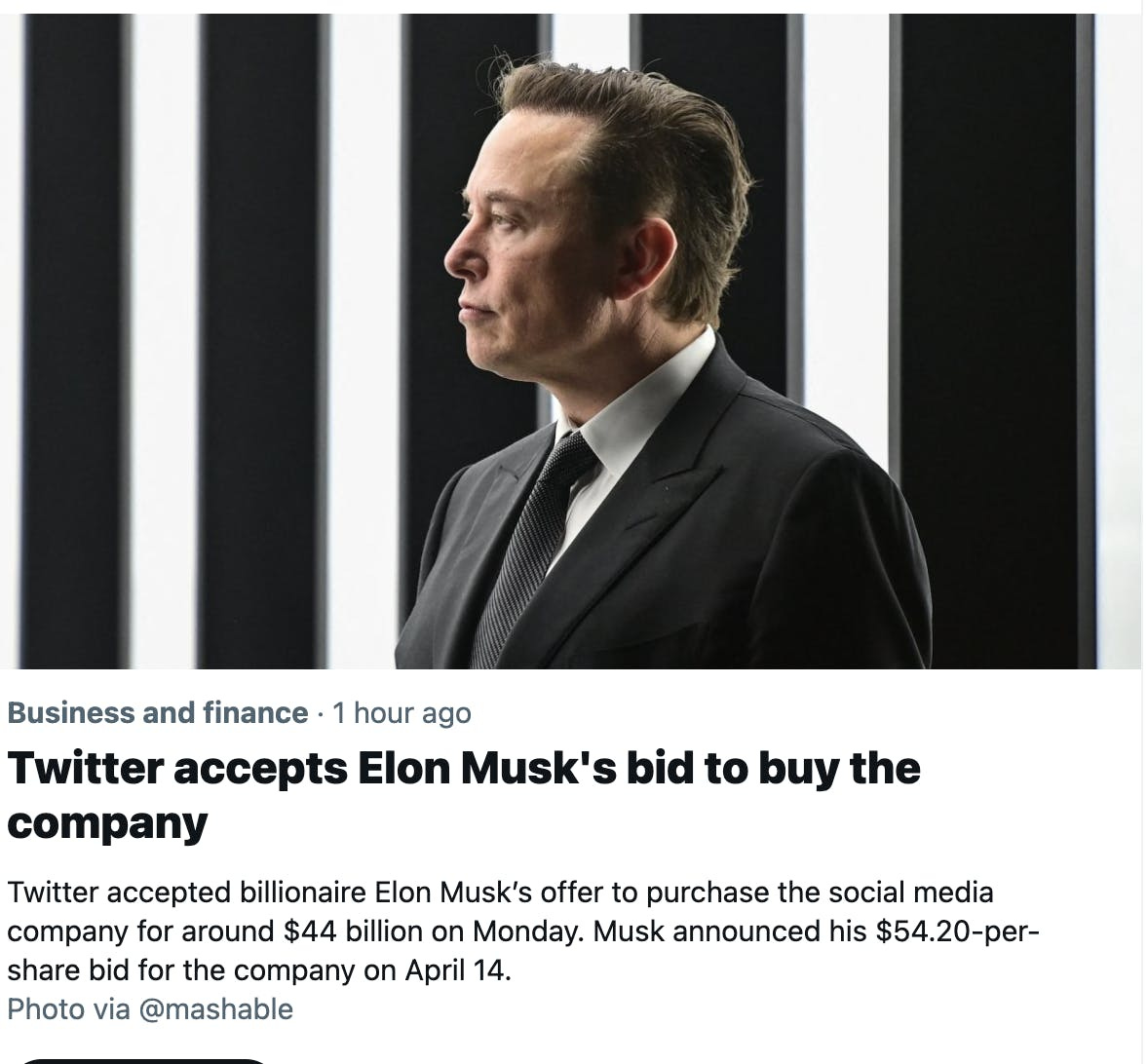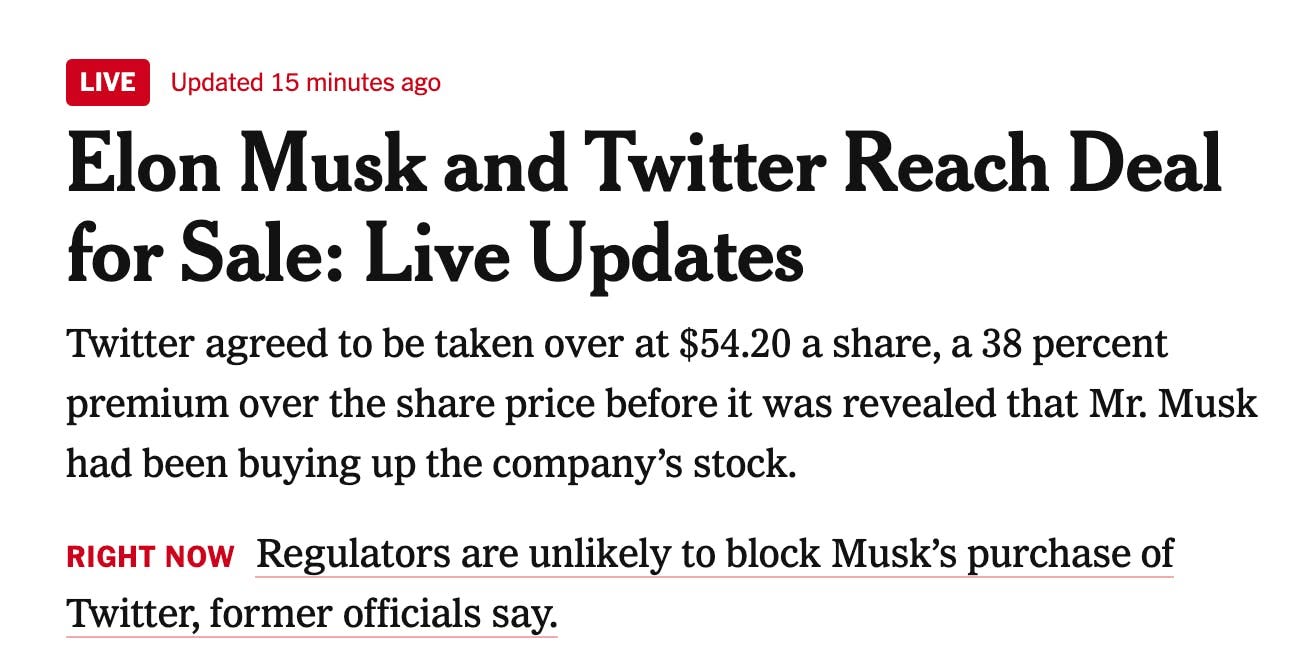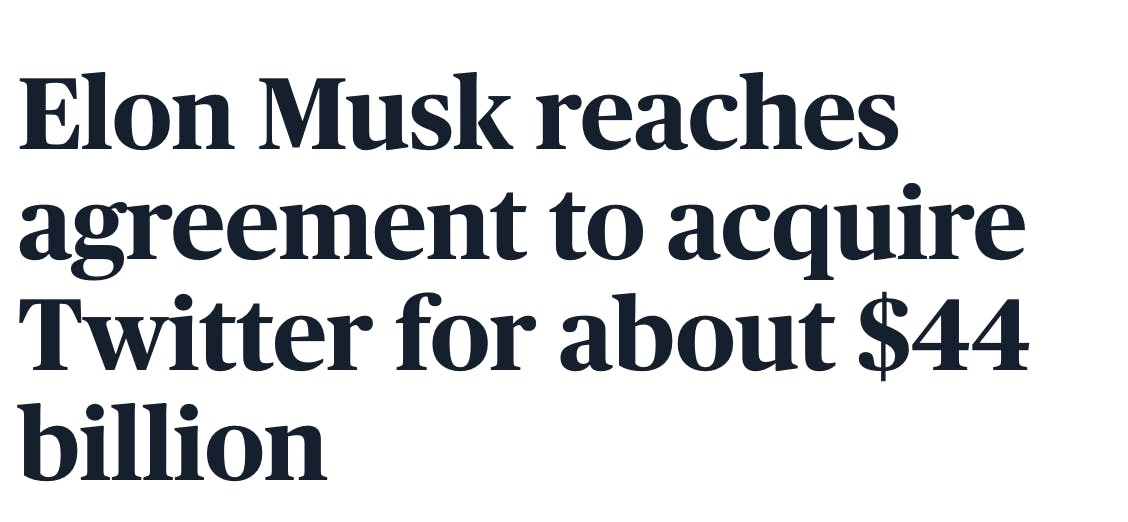How 7 Different News Outlets Announced Elon Musk's Bid for Twitter
What Makes Great Writing #006 - Featuring Elon Musk Headlines
Being in the political center is exhausting.
It means I’m not opinionated enough to draw an instant conclusion about whether Elon will destroy or save Twitter/the world.
(In case you don’t know what I’m talking about, lucky you.)
This is how every big event goes. Someone tells me about a REALLY IMPORTANT THING. By the time I try to get a clear picture of what happened, the actual news has been skewed to insane proportions. It feels like reading a newspaper in a night club through a kaleidoscope.
Frankly, I wanted to ignore the Elon Musk deal altogether
Then I got to looking at the headlines.
Then I got obsessed with how news organizations rearrange certain words, and what the consequences are when they do.
So, humor me.
Let’s skip the normal deep analysis and instead wander through the minefield of media surrounding Elon Musk and Twitter’s agreement to sell one of the most popular social media sites in the world.
I think you’ll be surprised just how varied the message is.
First up: Twitter’s announcement.
The subject here is “Twitter.” The verb is “accepts.”
A sentence’s subject is its main character. In this case, the story is about Twitter. Setting Elon as the object makes sense. When you tell stories about yourself, you are always the main character.
You see the same structure in FOX Business’s announcement, with “Twitter” as the subject and “accepts” as the verb. It even leads in the object with the same proper noun (Musk).
However, this sentence feels different. In the Twitter version, it felt like the company was doing Elon a favor. Here, it feels like the result was inevitable.
Why? Because of what Musk is possessing in the noun phrase. In this case, it’s not a “bid” we’re discussing. It’s a “deal.”
The root of the word “bid” in this sense means to “offer or proclaim”; “deal” here most likely comes from a root word meaning “arrange for mutual advantage.”
Both Elon and the board/founders of Twitter stand to gain from this transaction. There’s a shared benefit here. This story is about two entities.
That’s one reason I like the New York Times’ iteration of this news:
News journalism is supposed to be balanced. By using the coordinating conjunction “and,” neither subject is given the spotlight over the other.
Let’s also take a look at that verb: reach.
This, I think, is the most accurate verb. Two other more traditional news media - The Associated Press* and PBS - also picked it.
*The AP changed their headline at some point in the last 12 hours.
The history of the word “reach” (from Old and Middle English) implies an extension, a stretching.
This, I think, is a more truthful telling of the events. Musk initially offered this proposal 2 weeks ago. Twitter had to consider. Both took time to reach a deal. And even though neither the AP or PBS used “and” to give us dual subjects, they managed to keep both Musk and Twitter on somewhat equal footing.
Not every news outlet pulled that off. Reuters clearly highlighted Musk as the main character, who either “getting” Twitter, or “sealing” deals depending on which version of the headline you see.
Last but not least, let’s look at New York Magazine.
NY Mag has the most unique headline I saw, in part because of what they do not say.
Take a look at that towering, two-letter stick of dynamite at the end:
IT.
Why does this work? The answer is: audience.
Readers of NY Mag would be well aware of what “it” means.
When you know who you’re speaking with, less says more.
So, what do we take from this as writers? What conclusions can we reach about how news is communicated through words.
Here are my three big thoughts.
1) Our language is a mess.
Etymology is a mess. Grammar is a mess. Rhetoric is a mess.
Part of this mess comes from the fluidity of language itself. Dictionaries are history books. They can’t tell you what words mean. They can only tell you what they meant up to this point.
2) Humans are a mess
We are bent and biased creatures. I’m well aware that the headlines I’m calling “most accurate” here just happen to come from the media that matched my college education.
I was trained to like what I like. So were you.
3) News media is moving at the speed of light
It took me 3 hours to pick through all these verbs. I’d hope that every platform with any kind of following would show even more care than I have done here.
That isn’t always the case, though. It’s not uncommon that the pressures of leadership and readerships often choke out inaccurate information.
All of those reasons lead to a bigger reminder: As a writer, you have a responsibility to tell the truth, as best you can.
And on the quest for truth, it’s important to ask: “What does this really mean?” and “Why are they saying it this way?” These two questions inform not only what we read, but what we say.
In a world where free speech might soon become even freer, that’s a big deal.
Much love as always <3
-Todd B from Tennessee
P.S. I spelled kaleidoscope correctly on the first try. Miracle.











